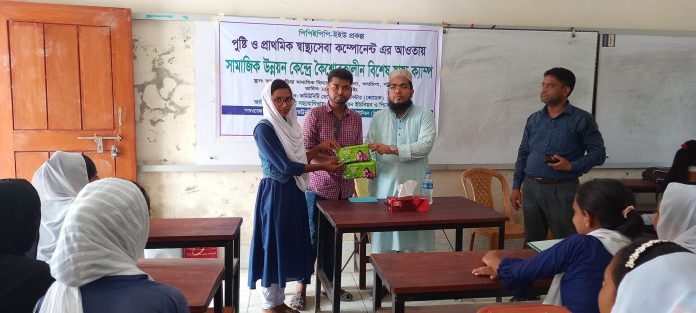As we all know, health is wealth, and a significant number of women in Bangladesh face health hazards due to unhygienic menstruation practices. Maintaining personal hygiene during menstruation is crucial for a woman’s reproductive health. Sadly, only 29% of women in Bangladesh (Source: BBS, National Hygiene Survey, 2018) have access to sanitary napkins. Many factors jeopardize the proper practice of menstrual hygiene management in this country. These include the lack of appropriate sanitation facilities and access to affordable, quality menstrual hygiene products.
The rate of sanitary napkin usage is much lower among members of the ultra-poor households under the PPEPP-EU project. PPEPP-EU has undertaken several initiatives, arranging special discussions in Mother and Child Forums and Social Development Center (Adolescent girls) as starting points for awareness-raising activities on the use of sanitary napkins in the project area. In these meetings, government officers of healthcare centers join as resource persons. The project’s work is not limited to awareness-raising. In some centers, it has also arranged availability of the sanitary napkin among adolescent girls.
Nurunnahar of Morrelganj, Bagerhat, the daughter of a day laborer, could not buy sanitary napkins due to their unavailability in nearby shops. Consequently, they were forced to use cloth instead of sanitary napkins. However, with the support of the Social Development Center of the PPEPP-EU project, buying sanitary napkins is no longer a problem. Nurunnahar said, “From CODEC (a partner organization of the project), a meeting was held on the use of sanitary napkins in our social development center. From that meeting, I learned about the benefits of using sanitary napkins. I can buy sanitary napkins at a low price from the Social Development Center, so now we don’t use cloth. This support has benefited us a lot.”
In the SouthWest Coastal areas, where saltwater intrusion is a significant challenge to ensuring menstrual hygiene, PPEPP-EU has implemented special initiatives. Tirdanga Union is a township on the banks of the river near the Sundarbans, where salty water is the only option for daily chores. Here, women did not use sanitary napkins, which resulted in health problems. Through awareness efforts, various projects were undertaken in the Social Development Centre, Mother and Child Forum, and PVC. Adolescent girl Swapna Roy, the daughter of a PVC member, suffered from severe cramps, white discharge, and various physical problems and was often absent from school. She was also prone to skin diseases. PPEPP-EU project staff met her and learned that she did not use sanitary napkins during menstruation. After becoming aware of the potential reproductive health hazards and solutions, Swapna’s mother started using sanitary napkins for herself and her daughter. She initially began buying sanitary napkins at a low price from the Social Development Center. After breaking the taboo and myths, they now visit local dispensaries or groceries as well.
Several health, social, and community mobilizing platforms of PPEPP-EU are working to break the silence among women and girls regarding menstrual health. They are also taught the importance of food and diet for a healthy and normal menstrual cycle, which has long-term positive effects on their immune system and reproductive health.


